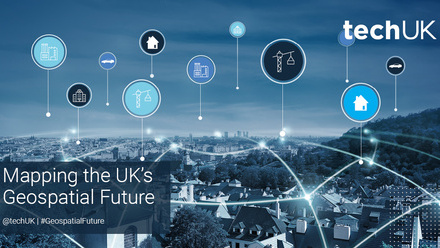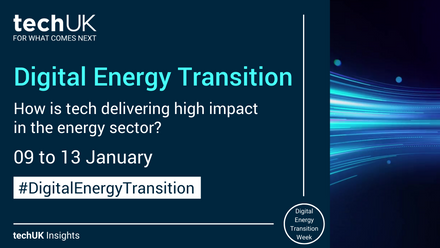techUK at CES 2023 - Day Two: Regulating Artificial Intelligence
CES naturally attracts a lot of attention due to exciting new product launches and the creative tech experiences on display on the show floor. However it’s also one of the key platforms through which the global tech community can come together to discuss key policy questions that governments around the world are grappling with in relation to emerging technologies. On day two at CES we delved deeper into some of these questions, and explored the HealthTech and wearables solutions that UK companies are showcasing at the show.
While the potential for new technologies to address some of our greatest challenges cannot be understated (see our Day One summary here), proportionate regulation is needed to ensure that these technologies are deployed in a way that is safe, ethical, competitive, and well-adjusted to the needs and expectations of the communities that it serves.
At this year’s CES we’re seeing particular attention being paid to the development of a common framework to regulate the application of artificial intelligence in a way that supports innovation while addressing legitimate public fears around the potential for undesirable use cases.
Laura Caroli, a Senior Policy Advisor at the European Parliament, outlined the core principles of the EU Artificial Intelligence Act, which may well be approved in 2023 and come into effect by 2026. The Act will introduce tiered requirements on providers and users of AI based on the perceived level of risk - while minimal-risk applications will remain largely unregulated and ‘lower-risk’ uses such as chatbots will be subject only to transparency/notification requirements, ‘higher-risk’ applications will be subject to more a comprehensive conformity assessment before going to market. ‘Higher-risk’ applications include those that make decisions about areas that are highly impactful to peoples’ lives, such as education, criminal justice, or credit worthiness. Finally, some uses of AI will be completely outlawed, including social scoring and “real-time” remote biometric identification systems’ in publicly accessible spaces.
The US is arguably a bit further away from passing AI-related legislation, but nonetheless a voluntary risk management framework is being developed by the National Institute of Standards and Technology (NIST) that aims to operationalise core principles that protect individual rights. Recognising that the risks around AI are inherently ‘sociotechnical’, NIST is developing a ‘flexible but measurable’ approach to managing AI-related risks that encompass a wider range of potential harms than a more technical risk such as cybersecurity.
The two systems have a lot in common - being risk-based rather than prescriptive, seeking to be proportionate and not stifle innovation, and developing systems that are more flexible than traditional product safety legislation and therefore better equipped to address the wider range of uses that AI can apply to. In December 2022 the US and EU agreed to work together on a joint AI Roadmap via the U.S.-EU Trade and Technology Council (TTC), which if successful could come to represent a global benchmark for AI regulation in the same way that GDPR has attracted attention from privacy legislators in other markets.
The UK featured little in the discussion and risks being left behind if we don’t engage on a more substantive basis as other Western markets push ahead with developing more aligned frameworks for AI regulation. Indeed, there is minimal UK government presence at CES 2023 and funding that in previous years was used to help small British companies to showcase their products and services in the Eureka Park startup hall has been withdrawn. The UK is conspicuously absent on the Eureka Park floor whereas France, Japan and Korea have very large numbers of exhibitors. There are also substantial national booths for Belgium, Israel, Italy, Netherlands, Switzerland, Taiwan, Turkey and Ukraine.
Spotlight on UK-based companies at CES 2023:
HealthTech and wearables are product categories that are particularly well-represented by UK-based companies at CES this year. Whether it’s lifestyle-enhancing wearables and sensors, or more medically-focused telehealth and vital sign measurement monitors, there has been incredible growth in the application of new technologies to this vertical. Some of the most impressive innovations we’ve seen in this space come from:
-
August International Ltd researches and develops portable and wearable digital products to supply the world market. At this year’s CES they’re launching the world’s first dual mode LTE-M / NB-IoT mobile Vital Sign Monitor.
-
BlueSkeye AI, a spin-out from Nottingham Technology Ventures, is the world leader in using face and voice sensing technology to understand health-related human behaviours.
-
Charco Neurotech, from Cambridge, are demonstrating a wearable medical device that can improve quality of life for sufferers of Parkinson's disease.
-
Novosound Ltd, located near Glasgow, has created a groundbreaking technique for the mass-production of printable ultrasound sensors. Their wearable ultrasound technology can measure a range of health variables such as dehydration and blood pressure.
-
SM24 are showcasing a wearable ergonomic patch that measures and continuously communicates live biomarker information to a mobile device to allow athletes, coaches, soldiers, patients and doctors to monitor glucose, hydration, cortisol and lactate in sweat.
-
Touchlab Limited, based in Edinburgh, have developed electronic skin technology to give robots the power of human touch. This tech solution will enable robotics to be more effectively applied not only to healthcare but to a range of other solutions including even nuclear decommissioning!
-
Valkyrie Industries - certainly one of the most fun products we’ve seen this year, the company is developing a connected armband capable of delivering resistance-based sensations to the body, taking VR / AR enabled muscle workouts to a whole new level.
Meet techUK at CES 2023
If you’d like to meet with techUK at CES 2023, please get in touch with our Head of Programme for Market Access & Consumer Tech, Lewis Walmesley-Browne at [email protected]
Check out other posts from this techUK @ CES series here:








